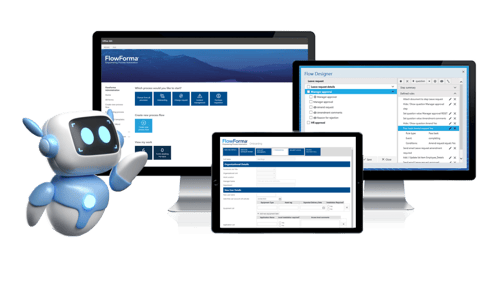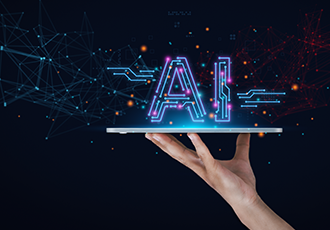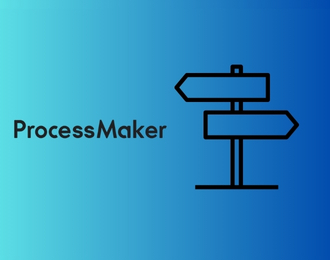In this blog post, we are about to embark on a journey through the cutting-edge realm of FlowForma Process Automation and its research for integration with artificial intelligence (AI), to revolutionize the way you automate and optimize your business processes.
In today's fast-paced business landscape, staying competitive means optimizing your workflows to work smarter, not harder. FlowForma Process Automation, an innovative no code workflow automation platform, empowers organizations to streamline their processes with precision and agility, fostering unparalleled efficiency.
What is AI workflow automation?
AI workflow automation is a powerful tool that uses algorithms to analyze data, make decisions, and complete tasks faster than humans can. FlowForma’s no-code platform, combined with AI, empowers users to effortlessly design, optimize, and deploy workflows that adapt and improve over time. This intelligent approach brings smarter solutions, transforming how businesses operate and opening up new possibilities for efficiency and growth.
AI workflows possess the remarkable ability to learn, adapt, and solve complex problems, ushering in an era of unprecedented possibilities for technology.

Machine learning algorithms help predict outcomes, detect anomalies, and suggest improvements, making AI an indispensable tool for modern business operations.
Artificial Intelligence (AI) has been making waves in the tech industry for years, but one aspect of it has been causing quite a stir recently: Generative AI. This remarkable technology is captivating both tech enthusiasts and industries worldwide, promising groundbreaking innovations across various domains.
Generative AI is a subset of artificial intelligence that focuses on creating content, often mimicking human creativity. It leverages techniques like deep learning and neural networks. The recent surge in Generative AI's popularity is accompanied by both excitement and concerns. Generative AI, a revolutionary technology, automates content creation and data input in the form filling process. It can generate natural language responses, reducing the need for manual data entry. By understanding context, it ensures accuracy and completeness in forms.
Want to see my AI workflow automation predictions? I recently hosted a webinar featuring my top predictions. Check the webinar out here below:
Benefits of workflow automation with AI
Organizations, irrespective of their scale and industry, are proactively exploring diverse applications and harnessing the potential of AI to secure a competitive advantage. AI process automation is versatile and can be applied to various sectors, including Construction, Finance, Healthcare, Manufacturing, Automotive, Logistics, Education, Oil, Gas and Energy. FlowForma, is envisaging to take a giant leap into the future by seamlessly integrating AI into its platform. Let us look at possibilities, how AI research at the heart of FlowForma's mission can elevate Business Process Automation:
.png?width=70&height=70&name=webinar%20speakers%20(1).png) Unleash Your Workforce's Potential: With AI handling repetitive and time-consuming tasks, your employees can redirect their energy towards high-value activities. They become more engaged, innovative, and capable of driving your business forward.
Unleash Your Workforce's Potential: With AI handling repetitive and time-consuming tasks, your employees can redirect their energy towards high-value activities. They become more engaged, innovative, and capable of driving your business forward.
.png?width=70&height=70&name=webinar%20speakers%20(2).png) Streamlined Document Generation and Handling: Manually processing documents is a thing of the past. Now AI can automatically extract and process data from documents, eliminating errors and boosting efficiency.
Streamlined Document Generation and Handling: Manually processing documents is a thing of the past. Now AI can automatically extract and process data from documents, eliminating errors and boosting efficiency.
.png?width=70&height=70&name=webinar%20speakers%20(3).png) Precision Decision-Making: AI-driven analytics can process vast amounts of data in real-time, providing insights and recommendations that empower your decision-makers. AI ensures data-driven precision.
Precision Decision-Making: AI-driven analytics can process vast amounts of data in real-time, providing insights and recommendations that empower your decision-makers. AI ensures data-driven precision.
.png?width=70&height=70&name=webinar%20speakers%20(5).png) Cost Efficiency: AI-driven Process Automation reduces operational costs significantly. By optimizing processes and minimizing errors, you will save both time and money.
Cost Efficiency: AI-driven Process Automation reduces operational costs significantly. By optimizing processes and minimizing errors, you will save both time and money.
.png?width=70&height=70&name=webinar%20speakers%20(6).png) Predictive Insights for Smarter Decisions: AI can analyze historical process data to predict bottlenecks, optimize workflows, and offer data-driven recommendations. Prescriptive and descriptive.
Predictive Insights for Smarter Decisions: AI can analyze historical process data to predict bottlenecks, optimize workflows, and offer data-driven recommendations. Prescriptive and descriptive.
.png?width=70&height=70&name=webinar%20speakers%20(7).png) Conversational Intelligence: Imagine conversing with your process management system in plain language. Natural Language Processing capabilities ensure that your system understands and acts upon natural language commands, making interaction intuitive and efficient.
Conversational Intelligence: Imagine conversing with your process management system in plain language. Natural Language Processing capabilities ensure that your system understands and acts upon natural language commands, making interaction intuitive and efficient.
In FlowForma Process Automation, we are actively involved in research to utilize the transformative potential of Generative AI for workflow automation, so that we can reduce the pain points of our users. We are currently on a journey ideating innovative AI use cases that will transform the traditional way our users work, so that we empower them with endless possibilities. Let’s discuss a few examples of the same.
Types of AI workflow automation
Generative AI adapts to various form structures and requirements, making it versatile for different applications. It excels in generating complex legal documents, medical reports, and customer inquiries, streamlining administrative tasks. Its potential extends to personalized form responses, enhancing user experiences. However, ethical considerations are crucial, especially regarding privacy and data security when using generative AI in form filling. Integrating this technology can significantly boost efficiency and productivity in administrative workflows.
Generative AI is a momentous change for flow designers. It automates the creation of complex workflows and decision trees, saving time and effort. With its predictive capabilities, it can suggest optimized flow structures and routing paths based on historical data. Flow designers can harness its natural language processing capabilities to automate communication within workflows. However, careful oversight is essential to ensure ethical and compliant use of generative AI in designing workflows. Embracing this technology can empower flow designers to create more efficient, adaptable, and intelligent processes.
Use cases for AI workflow automation
Use Case 1: Elevating Business Efficiency: Using AI to Generate Form Summaries
The Challenge:
In today's data-driven world, collecting and managing information through forms is a frequent practice across various industries. Forms are a ubiquitous tool in business operations, used for everything from customer surveys and employee feedback to market research and data collection. However, as the volume of form submissions grows, extracting meaningful insights from the data becomes increasingly challenging:
- Manual Effort:
Manually summarizing form responses is time-consuming and can lead to errors or inconsistencies.
- Resource Drain:
Businesses often allocate significant human resources to sift through and analyze form data.
- Delayed Insights:
The manual process can delay decision-making as teams wait for data to be processed and summarized.
The Solution:
 FlowForma’s approach is working on the integration of Generative AI to enhance its capabilities for form summarization. This will allow organizations to automate the summarization of form responses, making it easier to extract meaningful insights from the data collected in previous steps. In processes, when you open a form at any step, a quick summary of previous actions can provide immediate context which will be time saving and allow quick completion of the task.
FlowForma’s approach is working on the integration of Generative AI to enhance its capabilities for form summarization. This will allow organizations to automate the summarization of form responses, making it easier to extract meaningful insights from the data collected in previous steps. In processes, when you open a form at any step, a quick summary of previous actions can provide immediate context which will be time saving and allow quick completion of the task.
FlowForma is conceptualizing Generative AI workflow automation to summarize forms. Generative AI workflow automation can streamline the process of extracting valuable insights from form responses. This not only saves time but also ensures that decision-makers have access to clear, concise summaries that facilitate informed decision-making and action.
Use Case 2: The Future of Business Process Automation: AI-Powered Conversational Search Companion
The Challenge:
In the digital age, access to information is paramount for businesses looking to stay competitive and make informed decisions. Traditional search engines have long been the go-to tool for finding information, but they often fall short in providing context-rich, human-like results. Enter Generative AI, a breakthrough in AI-driven language models developed by OpenAI.
The Solution:
FlowForma aims to harness the power of generative AI search to extract relevant information in the context of the task that user is undertaking. Rather than a user having to use ChatGPT to find info, the process can include a pre-built integration with ChatGPT that asks a specific question to get an answer.
The question asked is controlled by the user. It will also mitigate the risk of individuals accessing ChatGPT in their own methods and receiving irrelevant information. This will standardize the response and reduce the risk of inaccurate responses inherent in ChatGPT. Generative AI's natural language processing capabilities make it an ideal candidate for business search.
Incorporating Generative AI workflow automation as a general search tool within businesses holds the promise of a more efficient, intuitive, and productive future. Its ability to understand natural language, provide context-rich responses, and sift through unstructured data makes it a significant change for information retrieval.
Generative AI search serves as a force multiplier for business process automation, allowing companies to stay agile and competitive in an increasingly data-driven landscape. Businesses that embrace AI process automation can gain a competitive edge by harnessing the full potential of their data and making more informed decisions.
Interested to learn more about LLMs? This guide from G2 compares the leading models and gives a detailed explanation of the key differences.
How to choose the right AI workflow automation tool?
I recommend following a strategic approach to selecting the right AI workflow tool. The following checklist will help guide your decision-making:
-
Is the tool used by peers in your industry?
-
Are there success stories you can reference?
-
Does the tool solve your business challenges?
-
Do they have a strong customer success team?
-
Can you take a free trial of the tool?
-
Is integration easy?
-
Does the tool offer multi-device (mobile etc.) rendering?
-
Is the tool within my budget?
-
Do I have the resources to deploy the tool?
-
Do I have buy-in across the organization for the project?
AI workflow automation trends
AI process automation is revolutionizing industries by leveraging artificial intelligence and machine learning to streamline and optimize business operations. The recent hype surrounding Generative AI is well-deserved, given its immense potential to revolutionize how we create, interact, and work. However, it is crucial to approach this technology with a sense of responsibility, ethics, and a long-term perspective. As we ride this wave of innovation, Generative AI workflow automation can transform the way businesses operate.
By automating tasks, analyzing data, and optimizing processes, organizations can achieve unprecedented levels of efficiency, cost savings, and customer satisfaction. The integration of Generative AI into business process automation offers real-world benefits that can give your business a competitive edge.
Fusion of Generative AI with no code business process automation aims to increase the accessibility for business users, who may not possess technical expertise. In conclusion, AI process automation stands at the forefront of transformative change in the way businesses operate. With a judicious and well-executed adoption, AI process automation has the potential to redefine the future of work and drive sustainable success in the ever-evolving landscape of business.
Want to see even more future AI trends? Check out FlowForma's latest AI-powered feature, CoPilot.
Conclusion
The era of manual, error-prone, and time-consuming processes is fading, replaced by a AI-enabled, smarter, more efficient, and dynamic way of doing business Embrace this powerful combination of AI with process automation and watch your organization thrive in the digital age.
Take your first steps with a 7-day free trial of FlowForma Process Automation. Get started today!
.png)



.png?width=70&height=70&name=webinar%20speakers%20(1).png) Unleash Your Workforce's Potential:
Unleash Your Workforce's Potential:.png?width=70&height=70&name=webinar%20speakers%20(2).png) Streamlined
Streamlined .png?width=70&height=70&name=webinar%20speakers%20(3).png) Precision Decision-Making:
Precision Decision-Making:.png?width=70&height=70&name=webinar%20speakers%20(5).png)
.png?width=70&height=70&name=webinar%20speakers%20(6).png) Predictive Insights for Smarter Decisions:
Predictive Insights for Smarter Decisions:.png?width=70&height=70&name=webinar%20speakers%20(7).png) Conversational Intelligence:
Conversational Intelligence: 

